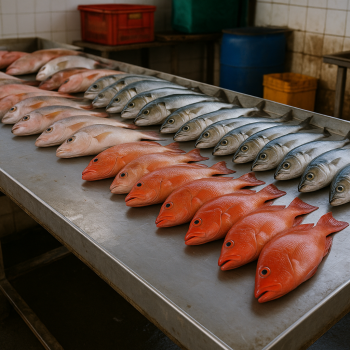Ciguatera Fish Poisoning Information

Table of Contents
Title
What is Ciguatera?
Ciguatera is a type poisoning caused by ingesting fish contaminated with ciguatoxin, characterized by both gastrointestinal and neurological symptoms. According to the National Food Safety Database, initial gastrointestinal symptoms include nausea, cramping and vomiting. These are typically followed by neurological discomforts which may include headaches, flushing, muscular aching and weakness, tingling and numbing sensations of the lips, tongue, mouth, dizziness, myalgia, and arthralgia (Otwell, 1999). In more severe cases, temperature reversals have been reported, and the symptoms may last anywhere from a few days to years. Locals typically claim that “once you get fish poisoned, you always have it” as recurrence of symptoms is common, particularly after alcohol consumption or eating ciguatoxic fish (that would normally not have affected humans).
Title
How do you recognize a fish with Ciguatera?
There are no tell-tale signs that let a person know that a fish is affected with the toxin. Visually, the flesh and colouration of the scales appear the same. There is no variation or change in the smell or even the taste of the fish.
Commercially there are no tests that have been validated for the use of detecting the toxin in fishes, though research to create test kits that are both efficient and cost effective are in development.
What is the status of Ciguatera in the Virgin Islands?
Though all fish that participate in a food chain containing ciguatoxin have the potential to acquire it, some are more prone to do so than others. There are 95 such known fish species in the Virgin Islands. Some, such as the barracuda, are more notable in their ability to do so. Generally, fishes that carry the ciguatoxin tend to be located on the south side of the islands.
It is important to note that having the ability to acquire the toxin does not mean that any or all members of the species will do so, or that the toxin levels will be of a significant amount to be harmful to humans.
Title
How Is Ciguatera Prevented
In the Virgin Islands, there is no official monitoring program for ciguatera. As is the case in many places, the local fishermen are familiar with the locations prone to ciguatera and do not acquire fish in those regions. As a result, individuals unfamiliar with local fishing practices should purchase fish only from reputable businesses or commercial fishermen.
Contact Information
Agriculture and Fisheries Department - Tortola
Paraquita Bay, Tortola
Virgin Islands (British) VG1110
Business Hours:
General Office - Paraquita Bay - 8:30 a.m. to 4:30 p.m.
Abattoir - 7:00 a.m. to 3:00 p.m.
Airport - 7:00 a.m. to 10:00 p.m.
Telephone: Paraquita Bay - 1(284) 468-6123/6124
Veterinary Unit - 1 (284) 468 - 6197
Email Addresses: doaf@gov.vg, fisheries@gov.vg, vet@gov.vg, plantproduction@gov.vg
Agriculture and Fisheries Department - Virgin Gorda
The Valley, Virgin Gorda
Virgin Islands (British) VG1150
Business Hours:
Virgin Gorda Office: 8:30 a.m. to 4:30 p.m.
Telephone: 1(284) 468-9263/6506/6507
Email Addresses: doaf@gov.vg, fisheries@gov.vg, vet@gov.vg, plantproduction@gov.vg
